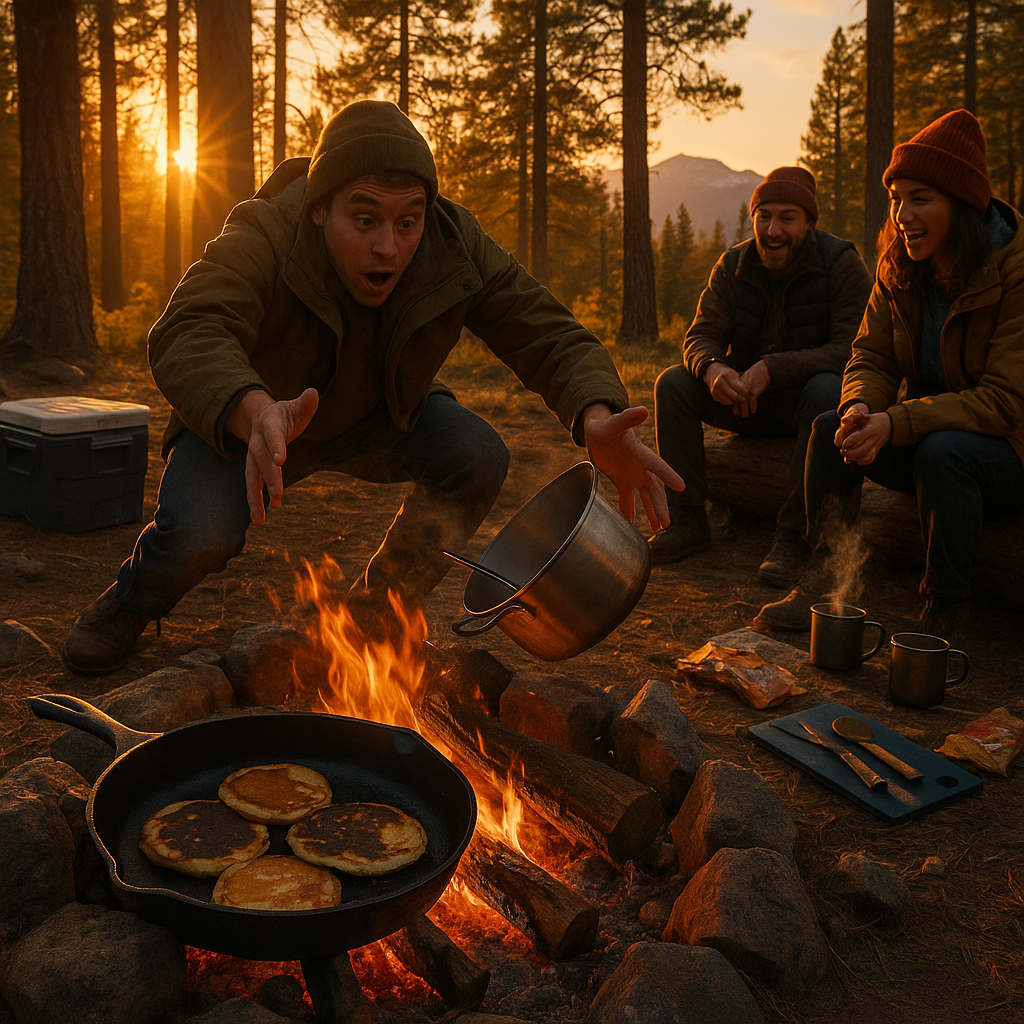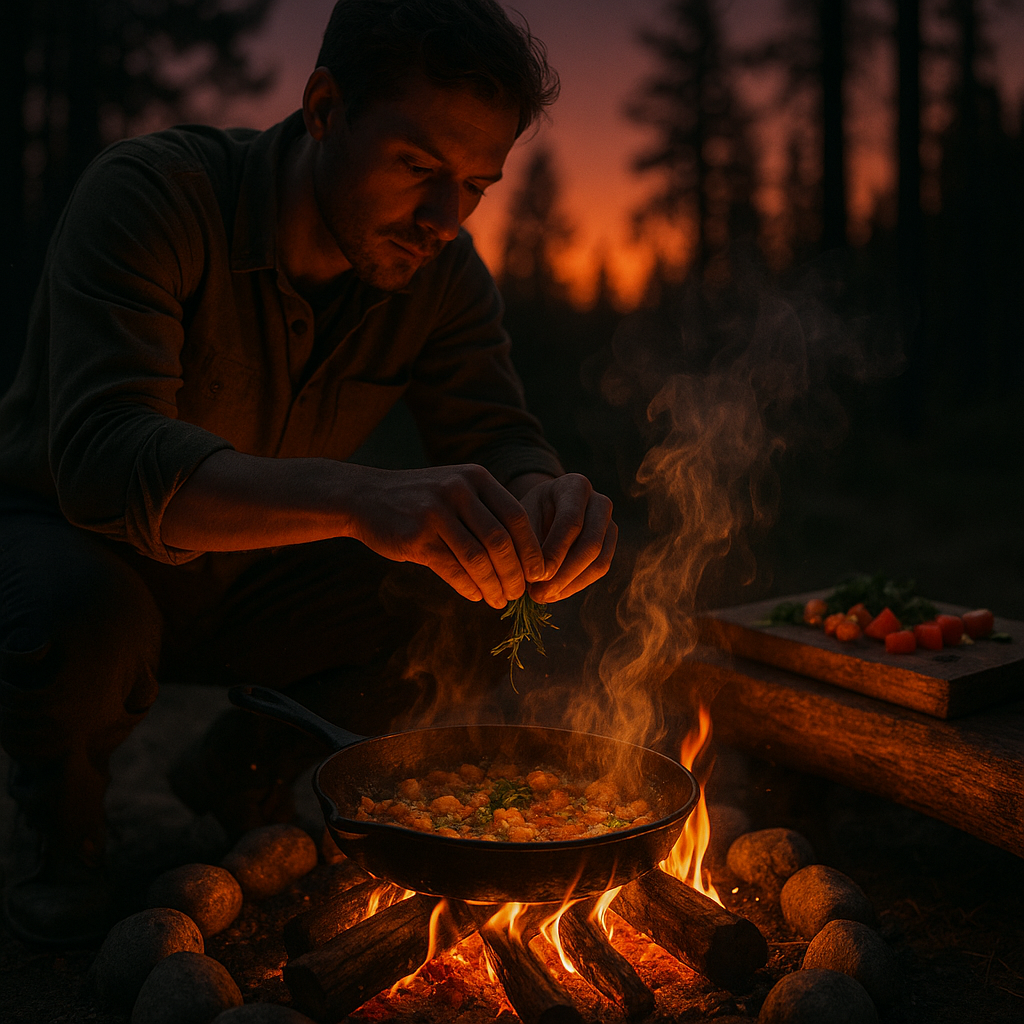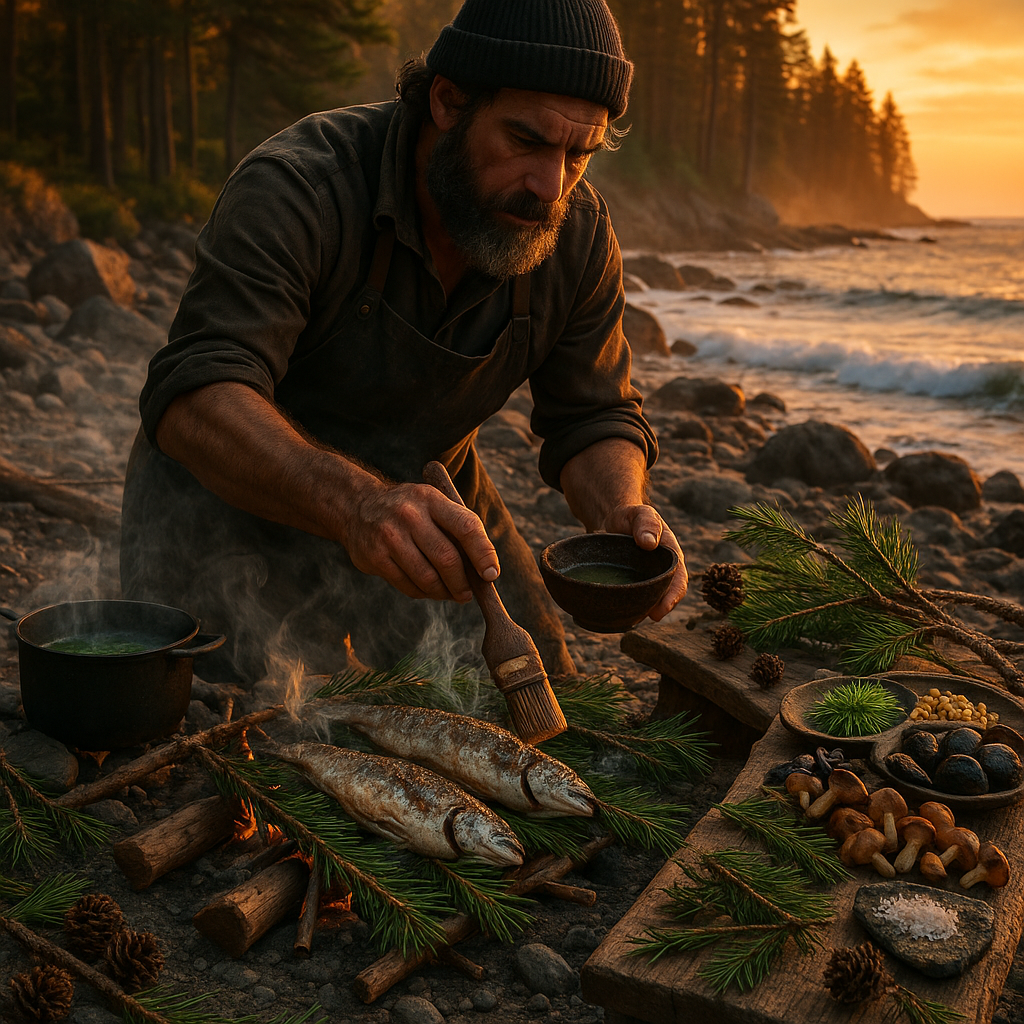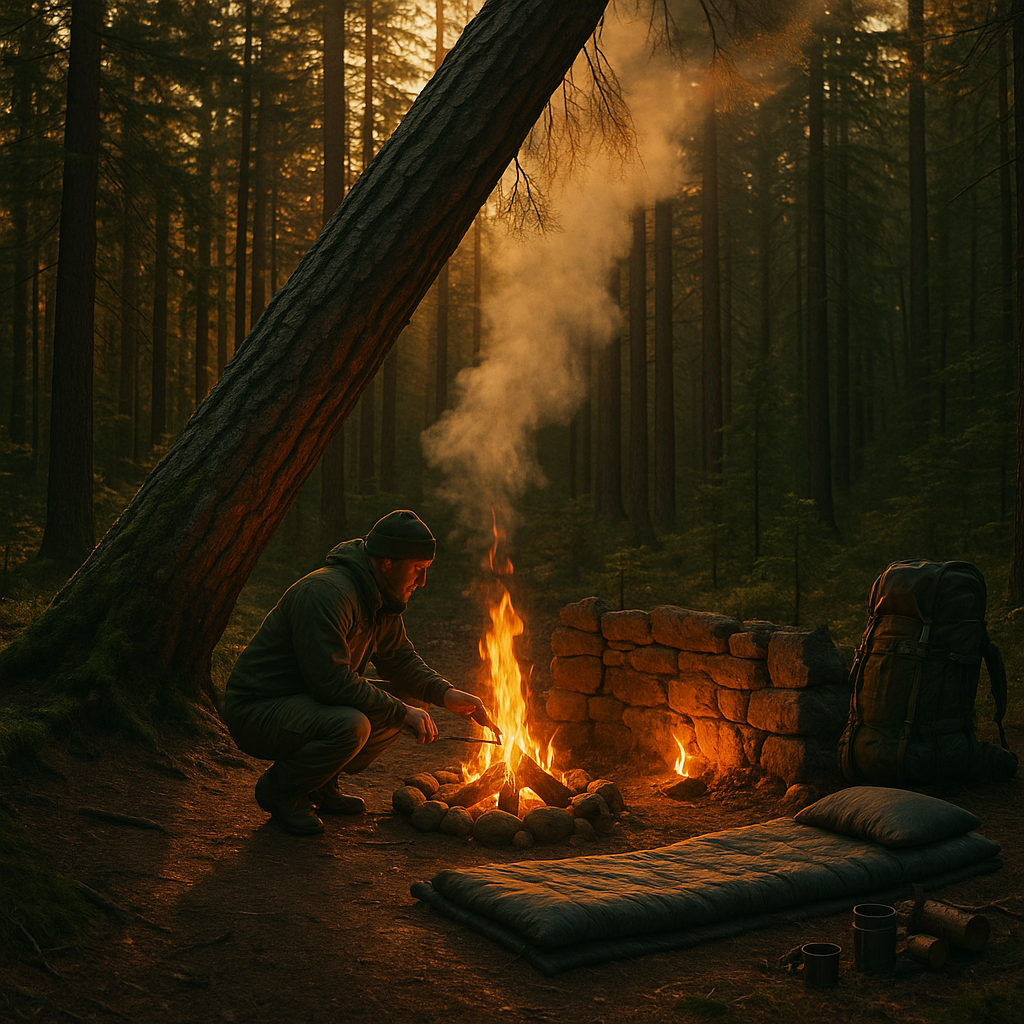Key Takeaways
Every seasoned camper holds a legend or two about campfire cooking disasters. Those smoke-choked, fire-singed episodes that leave you hungry, humbled, and, eventually, laughing beneath wide-open skies. Chasing the perfect fireside meal, we quickly learn that the wild delights in rewriting our plans. The true magic, however, is found not in flawless execution but in transforming those burnt blunders into unforgettable stories and lessons that shape our next adventure.
- Embrace the mess: Cooking fails are pure campfire gold. The most authentic memories are often born from blunders and burnt dinners. These missteps create deeper connections within your group and spark tales that overshadow effortless successes.
- Unplanned disasters ignite spontaneous solutions. Spilled pots, undercooked rice, or a wind that carries your supper into the woods force campers to improvise, yielding creative fixes and backup meals that become lore for years to come.
- Gear up, yet always expect the unexpected. No matter how meticulous the preparation or high-quality the equipment, nature (and gravity) have their own agenda. Backup meal ideas and a thoughtfully chosen kitchen spot can save both dinner and morale.
- Setup is survival: Choose your camp kitchen location wisely. From shifting winds to sloping ground, the right site, natural windbreaks, and gear arrangement mean the difference between a gourmet grin and a culinary meltdown.
- Share your imperfect journey. Retelling those wild campfire fails with humor and honesty inspires new campers and seasoned explorers alike. Vulnerability lays the foundation for community, courage, and humility in the great outdoors.
The wild rarely offers perfect outcomes. But it rewards us with epic memories, fire-roasted under starlit skies. So, gather close and let’s trade the real stories of camp cooking chaos, discovering the lessons that make every misadventure a moment worth savoring.
Introduction
The first time you spill dinner straight into the dirt or watch your eggs fuse to a skillet, you uncover a truth all campers eventually learn: campsite cooking fails are not only inevitable, they are often the backdrop for laughter and bonds that last long after the embers die down. Amid singed eyebrows, smoky eyes, and that unmistakable “crunch” in your fire-roasted potatoes, these outdoor misadventures shed their initial frustration and quickly become stories to cherish and retell.
What matters most is never the perfect meal but how you respond when wind, embers, or rain derail your plans. Each burnt pancake and hastily-opened can of beans strengthens your resilience and fuels moments of humor and connection. Now, let’s gather around the embers together, share tales of culinary misfortune, and uncover the simple lessons that turn wild accidents into enduring adventures.
Stay Sharp. Stay Ahead.
Join our Telegram Channel for exclusive content, real insights,
engage with us and other members and get access to
insider updates, early news and top insights.
 Join the Channel
Join the Channel
Not-So-Gourmet: The Anatomy of Campsite Cooking Fails
There is something primal about watching dawn break through the pines as flames flicker and the smell of coffee mingles with earth and smoke. Here, dreams of golden pancakes often collapse into sticky, charred reality. Every campfire circle has its secret legends, uniting friends and newcomers through humility and humor found in every burnt sausage or ash-laden rice grain. The mishaps become the foundation for our best stories by the fire.
On one brisk morning along the Colorado Plateau, I attempted a camp-sized pancake in a cast iron skillet over open flames. Above, the sun painted the sky gold; below, the result was raw on top and coal-black on the bottom. Friends armed with nothing but laughter and cowboy coffee gathered around to savor our “pancake chips.” Nobody remembers the flawless omelets, but we still talk about that smoky dawn—richer because everything went deliciously sideways.
Why do these mishaps matter? Sharing them removes the illusion of perfection and welcomes both beginners and experienced campers into a circle of camaraderie. Around Firestone-Feast, each singed marshmallow and overturned skillet is celebrated as a badge of honor (proof that flavor is only half the feast). The other half is the laughter and lessons earned with every wild meal.
As we peel back the layers on these notorious campfire cooking problems, let’s seek out the warmth and wisdom hidden in each smoky misadventure.
Gear Gaffes: When Tools Turn Traitor
Even the most carefully chosen gear can transform anticipation into absurdity. Camp cooking hinges on preparation, but sometimes it’s the smallest details that unravel your dinner plans.
Recall the infamous Great Tongs Disaster at Michigan’s Sleeping Bear Dunes. A friend reached for our only pair of metal tongs, only to see them snap in two while fishing brats from the blaze. For the following hour, we turned to wooden spoons and a foraged stick, sending sausages tumbling into the ashes and learning a hard lesson about backups.
Frequent Camp Cooking Gear Mishaps:
- Bringing non-stick pans that warp over fire, resulting in unevenly cooked potatoes or melted coatings.
- Forgetting critical fire starters, like lighters or waterproof matches, and discovering that your culinary ambitions depend on stubborn damp tinder.
- Relying on a single fuel canister with no spare, only to eat cold beans and trail mix once it sputters out halfway through your second meal.
Actionable Tips:
- Test all gear at home in real-life scenarios before packing up.
- Choose rugged, fire-ready cookware such as cast iron or heavy-duty stainless steel.
- Always carry multiple fire starting methods (flint, matches, or even a magnifying glass for sunny days) and tuck an extra set of utensils deep in your gear.
When gear lets you down, take it as an invitation to get inventive. These disasters often signal the beginning of collective resourcefulness and the sorts of stories you’ll carry back from the wild.
However, even top-tier tools can’t outwit the challenges of your chosen camp kitchen location. Let’s turn to the landscape, where every detail matters.
Campsite Setup Snafus: Location, Location, and Wind
Choosing your campsite is an act of both wonder and practical wisdom. The wildest, most scenic spot can quietly conspire against your culinary plans if you don’t respect its contours and moods. Beyond recipes or gadgets, success in outdoor cooking comes from reading the land (recognizing how the wind, slope, and shelter will shape your meal).
Take, for example, a dinner along Utah’s San Rafael Swell. We set up on a cliff for the unparalleled view, but realized too late that our tortillas and sautéed peppers would become airborne, carried off by a strong evening wind. Beauty is inspiring, but practicality keeps your food (and patience) grounded.
Insights for Successful Campsite Kitchens:
- Select spots protected from wind yet distant from overhanging branches or flammable brush.
- Seek flat, stable ground for fire rings or stoves, where pans don’t roll and soups aren’t lost to gravity.
- Store all ingredients in critter-resistant containers. Nothing unites a campsite like the midnight discovery of local wildlife in the snack bag.
Mini-Checklist for Setup:
- Is the fire pit stable and well-sheltered?
- Are supplies stored safely out of wildlife reach?
- Do you have plenty of space to cook without tripping over roots or gear?
Real-world mishaps, like the time our camp kitchen was overrun by a flash rainstorm, quickly devolving into a sea of mud, teach us that adaptability trumps precision. Faced with soggy dinners, we reached for humor and company to carry us through.
With your site now prepped, it’s time to address the primal element that ties every feast together: fire.
Stay Sharp. Stay Ahead.
Join our Telegram Channel for exclusive content, real insights,
engage with us and other members and get access to
insider updates, early news and top insights.
 Join the Channel
Join the Channel
Mastering the Flames (Or Not): Fire Cooking Fumbles
Cooking over open fire inspires awe, but just as often, it brings a solid dose of humility. Outdoor flames are unpredictable, and every seasoned camper has a tale of meals lost to overzealous blazes or feeble smokiness.
I’ll never forget the “Salmon Catastrophe of Cascade Lakes.” Hopes were high as we set a cedar-planked fillet above glowing coals. Nearby winds, however, fanned the flames so fiercely that our fish was left tasting more of charcoal than the wild. The moment proved that fire, food, and a pinch of humility form the best memories.
Strategies to Minimize Fire Mishaps:
- Build your fire incrementally (kindling, small sticks, then logs) for better control.
- Wait for a solid base of coals. Cooking over raw flames usually means burnt exteriors and raw centers.
- Manage heat zones by moving coals for searing versus simmering.
- Always have quick backup food (think: bread, fruit, snack packs) in case timing—or the weather—gets away from you.
When flavor and fire clash, lean into the shared story. Some of the best evenings have followed a failed meal, rescued by foraged berries, hard cheese, or the simple comfort of company.
Having experienced the unpredictability of fire, let’s talk about bouncing back when your main event disappears in a puff of smoke.
The Backup Plan: What to Do When Dinner Goes Up in Smoke
The best campers aren’t those who avoid disaster; they’re the ones prepared to bounce back. Resilience, far more than recipes, ensures no one leaves hungry even after a pot of stew meets the ground.
During one infamous “Tinfoil Calamity,” every campfire packet became a scorched, unrecoverable lump in the ashes. Rather than despair, we raided the snack sack and turned tortillas, canned beans, and cheese into makeshift quesadillas, crisped beautifully on remaining embers.
Reliable Backup Meal Ideas:
- Bring versatile, no-cook items: tortillas, cured meats, hard cheese, nuts, dried fruit.
- Stash instant oatmeal, ramen, or soup packets as emergency fillers. Most require only hot water (a small victory when patience and daylight are running out).
- Save a few morale boosters: chocolate, trail mix, or a bottle of wine for toasting your perseverance.
Practical Prep:
- Pre-chop vegetables, marinate meats, and portion spices at home for speed and ease.
- Store a mental or digital list of simple one-pot meals and fix-it strategies.
- Turn cooking fails into a game: who can dream up the most creative dish from the leftovers?
Sharing tales of disaster-turned-triumph lightens any mishap’s sting and strengthens the bonds of your group. Each story is an invitation for the next brave soul to take up the spatula (or the marshmallow stick).
With food rescued (or reimagined), let’s see how sharing these moments shapes our campfire community.
Sharing the Flame: Building Community Through Fails and Stories
Every scorched skillet and vanished s’more becomes part of the communal fabric of camping life. Sharing our less-than-perfect meals, both online and around the fire, fosters a culture of authenticity and support that welcomes everyone, rookies and veterans alike.
Platforms like Firestone-Feast’s #CampfireFails forum or dedicated outdoor groups create spaces to swap stories, laugh at misadventures, and exchange tips. Veterans offer guidance on embers and gear, while newcomers turn nerves into camaraderie and questions. Offline, campsite potlucks and cookouts generate lively discussions over who’s burned what and how to stage the next culinary comeback.
Sharing stories isn’t just cathartic—it’s a tradition stretching back to the earliest communal fires. If you’re looking to deepen those connections through food, consider practices like stone soup connection, where silence and shared preparation can unite a campsite in fresh ways. Or, if the unpredictability of camp cooking calls to you, try embracing the chaos with approaches for spontaneous camp meals—where improvisation becomes its own kind of recipe.
Ways to Connect and Grow:
- Share photos and stories using hashtags (#CampfireFails, #FeastFromTheFire) on social media to join a broader community.
- Attend camp cookouts and outdoor meetups focused on shared food experiences.
- Dive into the Firestone-Feast digital community. Submit your wildest or most heartfelt mishaps, and glean wisdom from others’ adventures.
Our brand culture thrives in these unvarnished moments. Imperfect meals ignite laughter, teach resilience, and reveal that the true heart of outdoor dining is found in our openness and willingness to share both the glory and disaster of the wild kitchen.
On your next journey, embrace uncertainty. Every fail lights the way to a deeper connection with nature, yourself, and the spirited fire at your campsite’s center. This is the very soul of food, fire, and freedom.
Conclusion
The wild world of campfire cooking is defined not by perfection but by improvisation, resilience, and shared experience. Each burnt pancake, toppled pot, or runaway sausage is a badge of courage—a testament to adaptability and the daring spirit that animates every great adventure. These missteps relieve the pressure to deliver gourmet spreads and invite us instead to savor the connection, humor, and wonder that rise from imperfect flames.
At Firestone-Feast, we treasure these unfiltered moments as vital reminders of what truly matters: fellowship, authenticity, and the deep satisfaction of meals forged in the heart of nature. As you gather around your next fire, whether success or disaster awaits, let your stories mingle with the smoke. Share your lessons and laughter freely.
The future of outdoor adventure belongs to those who turn even the simplest mistake into a reason to celebrate. The real feast will always be found in the journey itself, the wild, the warmth, and the freedom found under painted skies. How will you carry this spirit forward, transforming mishaps into memories, and forging stronger connections around every shared fire? The adventure is only just beginning, and your next great tale is waiting on the wind.
List of inserted links:
- Stone Soup Connection: How Silence & Shared Cooking Unite Communities — https://firestone-feast.com/stone-soup-connection-how-silence-shared-cooking-unite-communities
- Spontaneous Camp Meals: Creative Cooking Without a Plan — https://firestone-feast.com/spontaneous-camp-meals-creative-cooking-without-a-plan





Leave a Reply